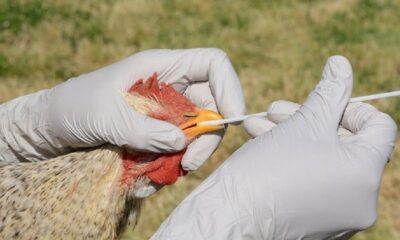Deandrea Hamilton
Editor
The Bahamas, March 7, 2025 – Nearly 25,000 eggs were destroyed by the Agriculture Department of the Turks and Caicos Islands, when officials learned that a local grocer sourced eggs from the Dominican Republic, without the requisite government approvals. An effort (by that grocery store) which was likely driven by the need to meet the surging demand and beat the soaring prices.
The TCI Animal Health Ordinance 2024 mandates the confiscation and destruction of the commodities, and violators may be subject to fines or other penalties, said a government issued release which also explained why eggs from the DR are not approved for Turks and Caicos consumption.
“It is important to note that the Dominican Republic has not declared itself free from Highly Pathogenic Avian Influenza, making it a high-risk zone for disease transmission into the TCI.”
The 24,840 eggs were discovered during a routine inspection of imports from the Dominican Republic on February 27, 2025.
While reaction to the decision has been mixed, other governments are under pressure to find relief in the cost of this item for consumers.
The Dominican Republic, according to media reports noticed the surge in demand years ago. The Latino-Caribbean country, which shares the island of Hispaniola with Haiti formulated a plan that is now paying off, tremendously.
News company, Dominican Today reports egg production for February and March in the DR has topped 350 million eggs.
“Since 2019, the country has implemented an avian influenza vaccination program to protect local production and stabilize the industry. Egg exports have also surged, with shipments averaging 67 million units per month in 2024 to markets such as Cuba, Aruba, and Haiti.”
These days the list of clients has grown and includes the British Virgin Islands and more recently, The Bahamas.
Super Value and its chain of over a dozen stores had to find a solution and introduced Super Value branded eggs to the market with the support of the Ministry of Agriculture.
Debra Symonette, President of Super Value, on Monday March 3, told Bahamian media: “The price of eggs has been soaring for months now, and we have been making every effort to bring these prices down. The bird flu has caused this. It’s been spreading across the US, and as a result, millions of chickens have been killed. As a result of the death of these birds, fewer eggs are being laid, and with the supply going down so significantly, the prices have continued to soar.”
The sticker shock spawned countless memes on social media; residents creating cell phone videos of the local price of eggs and sharing it online. Super Value soon stopped labelling the eggs with the steep price tags and even announced it was prepared to take the loss for households in The Bahamas did not suffer.
Super Value soon proved that its diligence would cement a new connection; a new source market would drive egg prices per dozen to below $4USD.
“We’re all trying to bring down the price of eggs to a considerable, an acceptable amount and today, we’re glad to say that the Super Value chain of stores, they would [have] reached out to the Ministry of Agriculture and Marine Resources, referenced the sources of eggs from some other areas who we’ve been trading with for a number of years, and we would have placed them in the hands of BAHFSA (The Bahamas Agricultural Health and Food Safety Authority) who is in charge all of those safety concerns, meeting all the requisite protocols and everything else,” said Neil Campbell, permanent secretary.
Campbell also confirmed the new price.
“And today we are pleased to say that through that initiative, we now brought down the price of the eggs to $3.79. Once you add VAT it is now $4.78. So it’s another initiative brought on by the Ministry of Agriculture, where we would have heard the cries of the public, the nation, and received directives.”
Initially the new supplier was not revealed, but it did not take long for the Dominican Republic to be identified. Almost simultaneously, it also became known that the Turks and Caicos destroyed eggs from the same country, for fear of lower safety standards.
Bahamians questioned whether The Bahamas government was allowing the grocery store chain to put public health at risk. Super Value aimed to allay fears.
Tribune Bahamas reported: Clifton Fernander, Super Value’s perishables buyer, yesterday reiterated that the lower-priced eggs – sourced from outside the traditional US supply chain – had met all the Government’s health and safety regulatory requirements amid questions over their origin, date, quality and nutritional value. Super Value itself had also tested the eggs’ condition itself by boiling and frying them.
The Bahamas Agricultural Health & Food Safety Authority also issued a statement on March 6.
“BAFSA is in receipt of documents from the Government of the Dominican Republic verifying that the consignment of eggs for Super Value is in good sanitary condition, complies with current regulations, and is, therefore suitable for export and human consumption.”
The fear about eggs and the surge in its cost stem from an outbreak of avian influenza in the United States.
U.S. media reports inform: More than 20 million egg-laying chickens in the US died last quarter because of bird flu, data from the US Department of Agriculture shows.
Egg production plants began shutting down during the second quarter of 2024 due to the detection of the H5N1 strain of bird flu. Initially costs edged up and then they more than doubled.
Beyond the frustrating costs now attached to this pantry staple, there has been cross contamination with deadly consequences for people. Earlier this year, a Louisianna native died after contracting the virus.
“As of January 6, 2025, there have been 66 confirmed human cases of H5N1 bird flu in the United States since 2024 and 67 since 2022. This is the first person in the United States who has died as a result of an H5 infection,” informed a January 6, 2025 statement issued by the CDC.
Sourcing eggs to end the “shell shock” to Bahamian consumers was widely praised and residents rushed to Super Value stores to take advantage of the more cost effect product; savings are pegged at around $5 per dozen.
“We have some on the shelves now. People seem to have already gotten the word because people are in there now like crazy everywhere. We’re putting them out as fast as we can.”


 News4 days ago
News4 days ago
 News1 week ago
News1 week ago
 Caribbean News5 days ago
Caribbean News5 days ago
 News4 days ago
News4 days ago





















